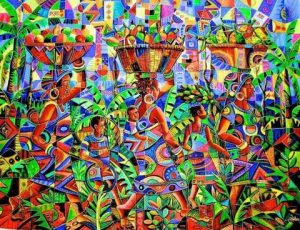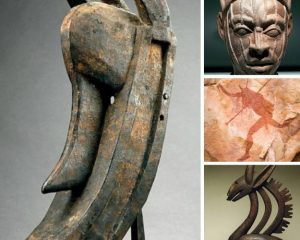
Primero para evitar confusiones debemos aclarar que al hablar de arte africano, nos referimos concretamente las artes visuales del África subsahariana, incluyendo disciplinas como la escultura, la pintura, la cerámica, el arte rupestre, los textiles, las máscaras, la decoración y ornamentación personal. Esto a su vez significa que las representaciones artísticas como los jeroglíficos y artefactos egipcios no son considerados arte tribal africano.
Características generales
Es difícil hacer un resumen útil de las principales características del arte del África subsahariana. La variedad de formas y prácticas es tan grande que el intento de hacerlo da lugar a una serie de afirmaciones que resultan igual de ciertas, por ejemplo, para el arte occidental.
Así, una parte del arte tradicional africano tiene valor como entretenimiento; otra tiene un significado político o ideológico; otra es instrumental en un contexto ritual; y otra tiene valor estético en sí misma. Lo más frecuente es que una obra de arte africana combine varios o todos estos elementos.
Del mismo modo, hay artistas que figuran en el establishment político y aquellos que son condenados al ostracismo y al desprecio. Algunas formas de arte pueden ser realizadas por cualquiera, mientras que otras exigen la devoción de un experto.
Se pueden hacer algunas observaciones generales sobre el estatus del arte subsahariano precolonial. Los filósofos del arte en Occidente podrían estar de acuerdo en que las obras de arte son simplemente artefactos hechos con la intención de poseer un valor estético, y en ese sentido el arte, que incluiría tanto la artesanía como las obras de arte, se encontraría efectivamente en todas las partes de África
Section 1.10.32 of «de Finibus Bonorum et Malorum», written by Cicero in 45 BC
«Sed ut perspiciatis unde omnis iste natus error sit voluptatem accusantium doloremque laudantium, totam rem aperiam, eaque ipsa quae ab illo inventore veritatis et quasi architecto beatae vitae dicta sunt explicabo. Nemo enim ipsam voluptatem quia voluptas sit aspernatur aut odit aut fugit, sed quia consequuntur magni dolores eos qui ratione voluptatem sequi nesciunt. Neque porro quisquam est, qui dolorem ipsum quia dolor sit amet, consectetur, adipisci velit, sed quia non numquam eius modi tempora incidunt ut labore et dolore magnam aliquam quaerat voluptatem. Ut enim ad minima veniam, quis nostrum exercitationem ullam corporis suscipit laboriosam, nisi ut aliquid ex ea commodi consequatur? Quis autem vel eum iure reprehenderit qui in ea voluptate velit esse quam nihil molestiae consequatur, vel illum qui dolorem eum fugiat quo voluptas nulla pariatur?»
1914 translation by H. Rackham
«But I must explain to you how all this mistaken idea of denouncing pleasure and praising pain was born and I will give you a complete account of the system, and expound the actual teachings of the great explorer of the truth, the master-builder of human happiness. No one rejects, dislikes, or avoids pleasure itself, because it is pleasure, but because those who do not know how to pursue pleasure rationally encounter consequences that are extremely painful. Nor again is there anyone who loves or pursues or desires to obtain pain of itself, because it is pain, but because occasionally circumstances occur in which toil and pain can procure him some great pleasure. To take a trivial example, which of us ever undertakes laborious physical exercise, except to obtain some advantage from it? But who has any right to find fault with a man who chooses to enjoy a pleasure that has no annoying consequences, or one who avoids a pain that produces no resultant pleasure?»
Section 1.10.33 of «de Finibus Bonorum et Malorum», written by Cicero in 45 BC
«At vero eos et accusamus et iusto odio dignissimos ducimus qui blanditiis praesentium voluptatum deleniti atque corrupti quos dolores et quas molestias excepturi sint occaecati cupiditate non provident, similique sunt in culpa qui officia deserunt mollitia animi, id est laborum et dolorum fuga. Et harum quidem rerum facilis est et expedita distinctio. Nam libero tempore, cum soluta nobis est eligendi optio cumque nihil impedit quo minus id quod maxime placeat facere possimus, omnis voluptas assumenda est, omnis dolor repellendus. Temporibus autem quibusdam et aut officiis debitis aut rerum necessitatibus saepe eveniet ut et voluptates repudiandae sint et molestiae non recusandae. Itaque earum rerum hic tenetur a sapiente delectus, ut aut reiciendis voluptatibus maiores alias consequatur aut perferendis doloribus asperiores repellat.»
1914 translation by H. Rackham
«On the other hand, we denounce with righteous indignation and dislike men who are so beguiled and demoralized by the charms of pleasure of the moment, so blinded by desire, that they cannot foresee the pain and trouble that are bound to ensue; and equal blame belongs to those who fail in their duty through weakness of will, which is the same as saying through shrinking from toil and pain. These cases are perfectly simple and easy to distinguish. In a free hour, when our power of choice is untrammelled and when nothing prevents our being able to do what we like best, every pleasure is to be welcomed and every pain avoided. But in certain circumstances and owing to the claims of duty or the obligations of business it will frequently occur that pleasures have to be repudiated and annoyances accepted. The wise man therefore always holds in these matters to this principle of selection: he rejects pleasures to secure other greater pleasures, or else he endures pains to avoid worse pains.»


